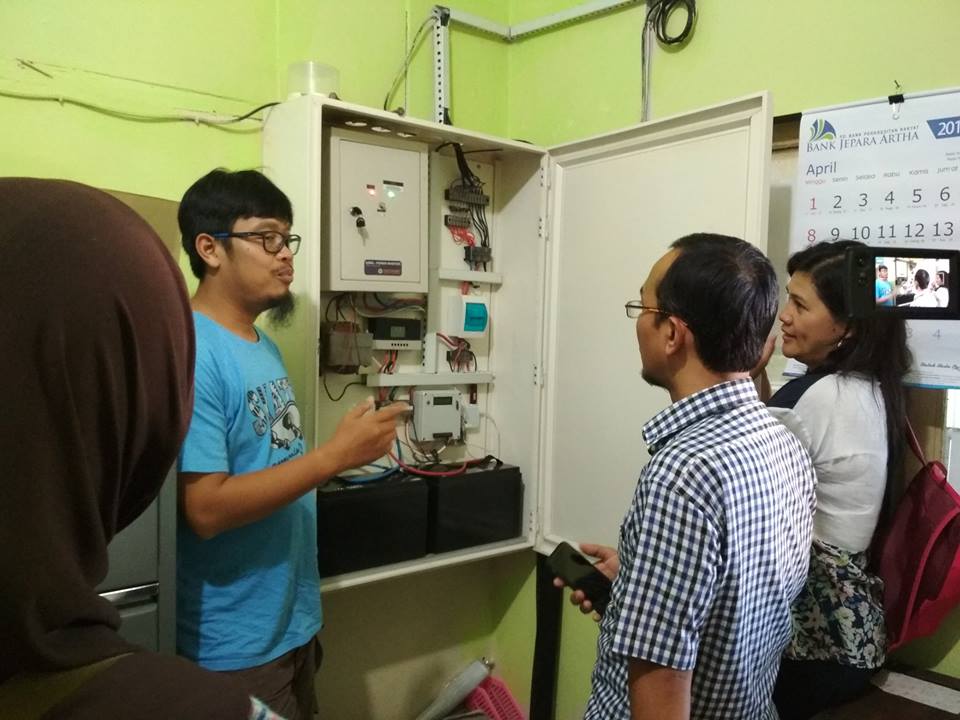 Team from Center for Development of Sustainable Region (CDSR) Universitas Gadjah Mada carried out an online monitoring system installation as well as research regarding women role and lesson learned from renewable energy project which had been implemented by Center for Energy Studies UGM in Karimunjawa Sub-district, Central Java Province.These activities were held for five days since April 30 until May 4, 2018. Karimunjawa Sub-district is located in Jepara Regency where this sub-district consists of 4 villages, including Karimunjawa Village, Parang Village, Nyamuk Village, and Kemojan Village. In 2014, Center for Energy Studies UGM funded by USAID installed 8 units of Solar Home System (SHS) with each capacity of 500 Wp and 4 units of Solar Water Pumping System (SWPS) with each capacity of 600 Wp for several public facilities in Karimunjawa Sub-district, including sub-district office, village offices, public health centers, mosque, and school. Aside from maintenance, monitoring is also required for maintaining the sustainability of those systems. Therefore, CDSR UGM installed online monitoring system, thus the SHS and SWPS that had been installed can be monitored online from UGM.
Team from Center for Development of Sustainable Region (CDSR) Universitas Gadjah Mada carried out an online monitoring system installation as well as research regarding women role and lesson learned from renewable energy project which had been implemented by Center for Energy Studies UGM in Karimunjawa Sub-district, Central Java Province.These activities were held for five days since April 30 until May 4, 2018. Karimunjawa Sub-district is located in Jepara Regency where this sub-district consists of 4 villages, including Karimunjawa Village, Parang Village, Nyamuk Village, and Kemojan Village. In 2014, Center for Energy Studies UGM funded by USAID installed 8 units of Solar Home System (SHS) with each capacity of 500 Wp and 4 units of Solar Water Pumping System (SWPS) with each capacity of 600 Wp for several public facilities in Karimunjawa Sub-district, including sub-district office, village offices, public health centers, mosque, and school. Aside from maintenance, monitoring is also required for maintaining the sustainability of those systems. Therefore, CDSR UGM installed online monitoring system, thus the SHS and SWPS that had been installed can be monitored online from UGM.
On the first day, CDSR team visited the head office of Karimunjawa Sub-district. The team’s arrival was welcomed by the office staff. CDSR team installed online monitoring system for SHS installed in the office. The SHS is still working and the electricity produced by the system is used for computer, internet facilty, printer, and the other equipment. In addition, CDSR team also held an interview with the office staff regarding the SHS condition, its maintenance routine, as well as the role of women staff in supporting the system’s management. After visiting the head office, CDSR team went to Safinul Huda Islamic Junior High School to conduct the same activities. SHS and SWPS installed in this school are used for pumping water and electricity supply for some appliances such as lamps, computer, and printer.
The next day, CDSR team installed online monitoring system in Parang Village. The team also repaired inverter of SHS which is broken due to the excessive electricity load. Aside from technical activities, the team conducted research regarding women role in rural electrification sustainability by holding a discussion forum with a local women community in the village. Based on the interview, the electricity produced by SHS and photovoltaic power system in Parang Village are used for vacuum frying machine to produce fruit crisp made from mangoes and kedondong (local commodities). After visiting Parang Village, CDSR team continued their trip to Nyamuk Village to conduct the same activities. SHS in Nyamuk Village is used for electricity supply for the village office, school, and health center. Meanwhile, this village also has SWPS to fulfill clean water need in the port.
Source: http://pse.ugm.ac.id/1420-2/
![]()

![]()
![]()
![]()
![]()

